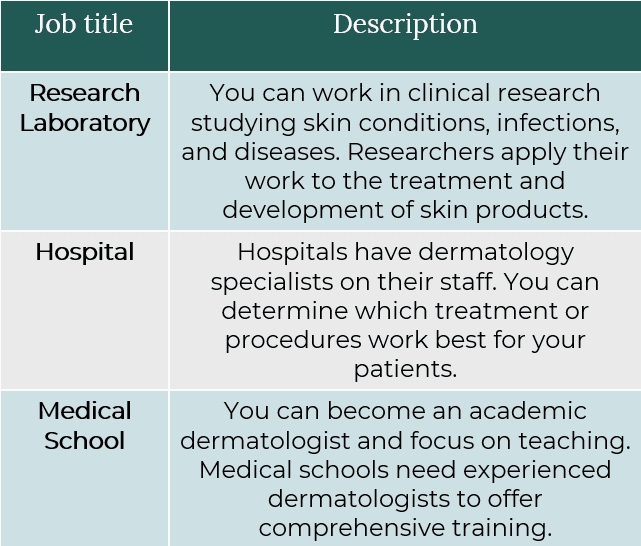Dermatologists are medical professionals who specialize in treating conditions that affect the skin, hair, and nails. They are responsible for diagnosing and treating a range of issues, including acne, eczema, psoriasis, skin cancer, and more. These professionals often work in private practices, hospitals, and healthcare clinics.
In this comprehensive guide, we will discuss various aspects of the dermatologist’s job, including education and training requirements, job responsibilities, job outlook, salary and benefits, challenges and rewards, personal qualities, and opportunities for advancement.
Education and Training Requirements
To become a dermatologist, candidates must complete extensive education and training. They must first earn a bachelor’s degree, typically in a science-related field, and then attend medical school. After receiving their medical degree, they must complete a residency in dermatology, which can take up to four years.
During this residency, dermatologists learn about diagnosing and treating skin conditions through clinical experience, attending conferences, and conducting research. They may also specialize in a particular area of dermatology, such as pediatric dermatology, cosmetic dermatology, or dermatopathology.
After completing their residency, aspiring dermatologists may choose to pursue further specialization through a fellowship program. These programs typically last one year and provide advanced training in a specific area of dermatology.
Job Responsibilities
Dermatologists are responsible for diagnosing and treating a wide range of skin conditions. They must examine patients to determine the cause of their symptoms, which may involve taking a detailed medical history, performing a physical exam, and ordering lab tests.
Once dermatologists have identified the root of the problem, they can recommend treatment options. This may include prescribing medication, performing surgical procedures, or providing topical treatments. They may also advise patients on ways to manage their condition at home.
In addition to diagnosing and treating skin disorders, dermatologists also play a key role in preventing skin cancer. They educate patients on the importance of sun protection and perform regular skin cancer screenings.
Job Outlook
The demand for dermatologists is expected to grow as the population ages and skin cancer rates continue to rise. According to the Bureau of Labor Statistics, employment for physicians and surgeons, including dermatologists, is projected to grow 4% from 2019 to 2029.
Salary and Benefits
Dermatologists are among the highest-paid medical professionals. According to the Medscape Dermatology Compensation Report 2020, the average annual salary for a dermatologist in the United States is $455,000. However, salaries can vary widely depending on the location, type of practice, and level of experience.
In addition to a high salary, dermatologists typically receive a range of benefits, including health insurance, retirement plans, and malpractice insurance.
Challenges and Rewards
Like any medical profession, dermatology can be challenging, but also incredibly rewarding. Dermatologists must stay up-to-date with advances in technology and techniques, manage a high caseload, and work under time pressure. However, they also have the opportunity to improve their patients’ quality of life by treating their skin conditions and detecting skin cancer early.
Personal Qualities
To succeed as a dermatologist, candidates must have a strong desire to help patients and a passion for dermatology. They must also have excellent communication, problem-solving, and interpersonal skills, as they will work closely with patients, medical staff, and other professionals.
Opportunities for Advancement
Dermatologists have a variety of options for career advancement. Some may choose to specialize in a particular area, allowing them to become experts in the field. Others may pursue research opportunities or combine clinical work with teaching at a medical school.
Conclusion
Becoming a dermatologist takes years of education and training, but the rewards are significant. Dermatologists have the opportunity to work with patients to improve their skin health and prevent skin cancer. They also enjoy a high salary and a range of benefits. If you’re passionate about helping patients and have a desire to work in dermatology, a career as a dermatologist may be right for you.
Frequently Asked Question About Dermatologists Career
1. What types of skin conditions do dermatologists treat?
Dermatologists specialize in diagnosing and treating a range of skin conditions, such as acne, psoriasis, eczema, rosacea, skin cancer, and other skin growths, rashes, and wounds. They also provide cosmetic services, including Botox, fillers, laser treatments, and chemical peels.
2. When should I see a dermatologist?
You should see a dermatologist if you have a persistent or severe skin problem that does not respond to over-the-counter or home remedies, such as rash, itchiness, redness, bleeding, blistering, or scaling. You should also schedule a regular skin exam if you have a family history of skin cancer, sun damage, or other risk factors.
3. How do dermatologists diagnose skin conditions?
Dermatologists use their clinical skills and tools, such as a dermatoscope, magnifying lens, or biopsy, to examine and analyze the skin lesion or spot in detail. They may also ask you questions about your symptoms, medical history, family history, or lifestyle habits to gather more information. Depending on the findings, they may recommend further tests, such as a blood test, culture, or imaging, to confirm the diagnosis.
4. What treatments do dermatologists use for skin conditions?
Dermatologists use a variety of treatments for skin conditions, depending on the type, severity, and location of the problem. They may prescribe topical or oral medications, such as steroids, antibiotics, retinoids, or immuno-suppressants. They may also perform procedures, such as excision, cryotherapy, laser surgery, or photodynamic therapy. The choice of treatment depends on the individual patient’s needs, preferences, and risks.
5. How can I choose a good dermatologist?
To choose a good dermatologist, you can ask for referrals from your primary care physician, friends, or family members who have had positive experiences with a dermatologist. You can also research online for dermatologists in your area who specialize in your specific skin condition or treatment. Look for board-certified dermatologists who have a good reputation, experience, and credentials. You can also read reviews or testimonials from previous patients to get an idea of their bedside manner, communication skills, and outcomes.

